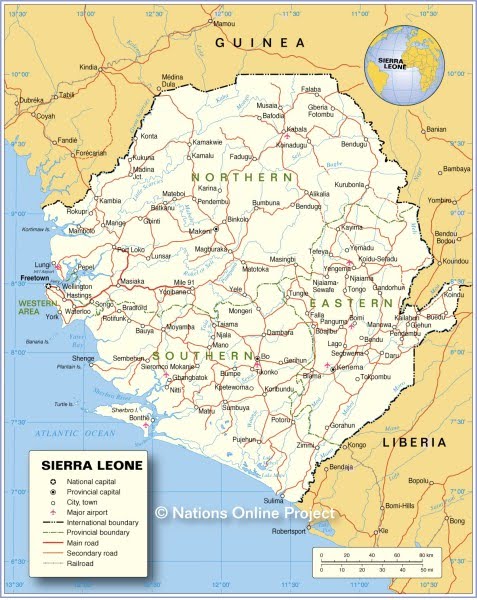

Whilst our teaching appointments at Sierra Leone Theological and Church Training Centre are our principal responsibilities we are also attached to the City Mission Circuit, which involves establishing relationships with the two large congregations of Balmer and Grace Brethren Methodist Churches. Our colleagues include the circuit superintendent Rev Philip Kaikurah, at present a temporary neighbour, who is awaiting repairs to the manse, and Rev Alpheus S Karoma, both of the Mende tribe from the east and south of Salone.
By the time reached Grace Brethren Methodist Church,(see above left) for last Sunday’s morning worship, we had already eavesdropped on an intense discussion between the Muslim taxi driver and the front seat passenger, on the essential worth of worshiping Allah and the basic requirements of Islam. The conversation was in animated Krio and clearly both men were in agreement on the importance and value of their faith and as we left the taxi at the front of the church, we were given their generous farewells.
During the service there was a baptism and a thanksgiving for the life of one of the church’s long standing servants. The service was therefore attended by two extended families, present to give witness to significant moments in their communal life. Each week it is customary for the congregation to be asked if there are any new visitors present, and to invite those who are from other churches or who are Muslims, to acknowledge their presence in order to be formally welcomed. The carefully prepared sermon offered by Rev Karoma, serious attention was given to day to day security and other ways in which assurance in life is offered. It also included reference to the existence of Salonians who are inclined to be religious but ungodly. I was swiftly aware of those people who I know who would not subscribe to being religious but who I would consider to be godly folk. I mused as to whether they are ‘irreligious but godly’
The words of the preacher soon began to mingle in my mind with the conversation heard in the taxi and continued to resonate far beyond the context of Freetown. I recalled the events of the week: in Malaysia where the debate on the authority of Christians who refer to Allah within their worship was challenged by some Muslims; to Egypt where Coptic Christians had been attacked in a reprisal for the rape of a Muslim woman by a Christian, which had resulted in injury and death; and also to Italy where people, thought to be Roman Catholics by the parish priest of the region, had attacked African migrant labourers with gun fire.
During day to day life in Freetown it is difficult not to reflect on the relationship of Muslims and Christians, of mosques and churches and of Islam and Christianity, as the people, their institutions and their belief systems are lived in such close proximity, that it would be more accurate to describe them as being intertwined and difficult to separate. Be it socially, educationally, economically and even devotionally, they occupy space and share oxygen together so that it is the norm at a local community meeting or official ceremony to commence with the saying together of a Muslim prayer, followed or proceeded, by the Lord’s Prayer.
It has been suggested that both Muslim and Christian Salonians’ desire to express and demonstrate their inter-faith unity is exaggerated. Both are swift to express recognition of the one same God and even suggest that the two faiths are equal , which may stem from their fear of identifying differences, lest it should imply antagonism. The hostility that exists between the two faiths in other West African states and in particular the occasional violent clashes of northern Nigeria, are seen as a consequence of acknowledging differences.
A college colleague suggests that the demographic balance of the similar number of Christians and Muslims in Salone society is responsible for the harmony, that is not to be found in any other West African country. In neighbouring Guinea there is a small Christian community and in Liberia a small Muslim community, so that each faith community functions differently and does not seek integration in the same way. In Salone society with its endemic poverty, Muslims, have no problem in eating imported “hogsfoot” or in sharing locally brewed liquors with their Christian relatives and neighbours. And likewise, adult male Christians are not averse to being married in church and then later in life taking an additional wife. Neither practice is a demonstration of orthodox belief in their respective religions but as my colleague indicates it the complexity of Salone’s Afro-Islamic/Christian lifestyle. The question is, would my other colleague consider such practices to be ‘religious and ungodly’? Or is it more a matter of being ‘irreligously godly’ in the name of living in peace in the midst of poverty?

No comments:
Post a Comment